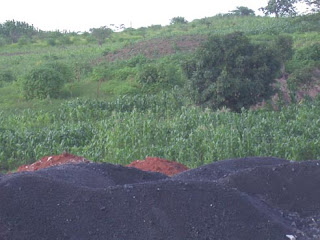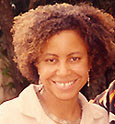 Yesterday, we traveled to see the king, or the paramount chief of the area. During our first visit to the mines, we met with the various sub-chiefs of the mining area, retroactively asking their permission after we had taken photos and talked with people in the mining area.
Yesterday, we traveled to see the king, or the paramount chief of the area. During our first visit to the mines, we met with the various sub-chiefs of the mining area, retroactively asking their permission after we had taken photos and talked with people in the mining area.We didn't follow protocol, so all the sub-chiefs and their relatives were insistent that we visit the king. So, on Sunday we drove along a relatively good (not flooded out, no major holes) dirt road, about 14 miles from the mining area, to visit the paramount chief who, by traditional law, owned most of the land in the area around Likasi town.
The few surrounding houses in the village were made of mud bricks with thatched roofs. But the chief had a tiny brick house, perhaps 15 feet by 7 feet, with a tin roof and two windows facing a dirt driveway that cut through tall grasses adjacent to a patchy front yard.
In the front yard was a shady mango tree and an open square shelter-- a thatched roof held up by four wooden poles, about 10 foot by 10 foot. As we drove up and parked on the lawn, we saw an old man sitting alone under the shelter, waiting, planted like a bush, smoking a cigarette.
The chief was perhaps in his late 60s, dark-skinned, wizened, with a salt-and-pepper afro and mustache. Dressed in western clothing, he wore a pink, green and white diagonally-striped button downed shirt, dark brown dress slacks, and black, shiny leather dress shoes. Underneath his chair was a pad and pen, just in case we said anything worth writing down.
We piled out of the car -- Horeb, Maitre, and Christian (another friend and colleague who does media and communications for World Vision in the eastern DRC). He and Horeb are childhood friends; they are both hilarious. We have lots of good conversations and laughs together.
Along the way we also picked up the chief's daughter, her husband and her child, who came to present us to the chief.
"You must bow before the chief. Keep bowing." Okay. Monkey see, monkey do. Making myself as small as possible, I followed the line and came behind, bowing.
Four of the chief's sons brought out blue plastic chairs, and under the shelter we formed a semi-circle facing the chief. Many adorable toddlers and young children hovered and played nearby, watching with interest this delegation of strangers. I, the "muzungu," drew the most stares. Throughout the visit, I frequently smiled and waved at the children in response.
We sat silent for a bit. Then Horeb asked the chief's daughter to introduce us.
A local variation of Swahili and some French was spoken. The chief nodded to each of us as we were introduced. He welcomed us, and then spent some time scolding us, saying that his small square brick house was the capital of the area and should have been our first stop before going anywhere in his territory. He then entreated us, as representatives from World Vision, to do more in the area to help the people. Silence, and many nodding heads.
Sometimes, protocol can obstruct progress. Shrewdly, at Horeb's direction, we had gone straight to the mines, relying upon Maitre, our local mining contact, to walk us around, rather than going to the paramount chief, knowing that the chief would most likely notify the authorities of our visit, who would have then prevented us from taking pictures and video or talking with people.
In cases like this, it is sometimes best to ask for forgiveness rather than permission. Recognizing this, I decided to apologize, hoping to ameliorate our insolence. "Is it alright for me to speak?" I whispered to Horeb. "Yes," he replied, "go ahead."
I spoke in English. Horeb translated. I earnestly thanked the chief for taking the time to meet with us, and profusely apologized -- "I am a dumb muzungu, and did not know to stop by here, the capital, first. Please forgive me. I am very, very sorry."
I think my apology was accepted, and that seemed to break some of the ice. The chief mildly nodded in acceptance and continued on, pragmatically asking World Vision to build a school and a hospital. He had a gravelly, raspy voice, like Charlie Rangel, and as he spoke, he smoked, poking fun at us ... "Many people like you have come by, seemingly like tall white warriors ready to fight, saying many words, writing things down, but no action."
All of us in the circle laughed. He was absolutely right. Many promises and no action is meaningless. I admired his pragmatism. By now, the chief was on his third or fourth cigarette.
"I will pray, but I won't hope. But I am glad you are here. Perhaps it is a sign from God." Under the shade of the shelter and the tree, the group continued in dialogue for about an hour, and the chief continued to crack sardonic, pragmatic quips at the promises of NGOs and outsiders.
"Are there other needs in the community?" Horeb asked.
"Yes, many," the chief replied, "but I won't ask, for fear that you will do nothing. Let's go slowly -- slowly. The most important thing is to at least build a school for our children, delivering us from this slavery."
Yes, indeed. Though we never raised the issue of children in the mines, the chief was aware of the problem and also grasped the solution.
I liked the chief; I admired his pragmatism and wit.
After our talk, the group briefly walked around the area. We stopped by the village well, a covered cistern with a crude metal ladle attached to the lid. Horeb took pictures. The water inside looked like watery chocolate milk.
"This is what they drink," said Christian.
"God, how awful," I replied. "The children must suffer with diarrhea and sickness."
"Yes, and cholera is a big problem in this area."
 We walked back to the chief's house, through a small field of tall grasses. "Horeb, are there snakes in these grasses?"
We walked back to the chief's house, through a small field of tall grasses. "Horeb, are there snakes in these grasses?""No, Rory, those are only in the jungle, in Ituri, and in North Kivu." Yeah, right.
"Here, only small snakes."
"I'd better not get eaten like that UN guy who got swallowed by a boa in his tent!" I exclaimed. "Can you imagine calling home to my dear sweet mother and telling her that her daughter got swallowed by a snake in the Congo! She would hunt you down and cut you guys!"
My mom is 5'3" and about 110 pounds, but, indeed, I have no doubt she would.
"No, Rory, we are putting you in the middle, so no snake will get you," said Christian, smiling. "And I'm telling you, they are not here."
"Never fear. We have you protected," promised Horeb.
"Just like George Bush," I answered. We all laughed.
"George Bush. I like that man!" Horeb declared, wagging his finger. "Small words, big actions. I like that man!"
As we walked through the grasses, Horeb and Christian continued to laugh and joke about snakes and how different plants can make you strong. We returned and again thanked the chief before piling back into the LandRover. As a group, we left laughing, but with resolve to urge our World Vision colleagues to help this community.
We were glad and relieved at the pleasant, patient exchange with the chain-smoking chief.
Posted by Larry Short on behalf of Rory Anderson in the Congo.





